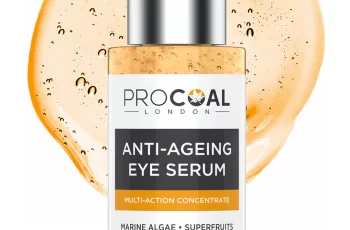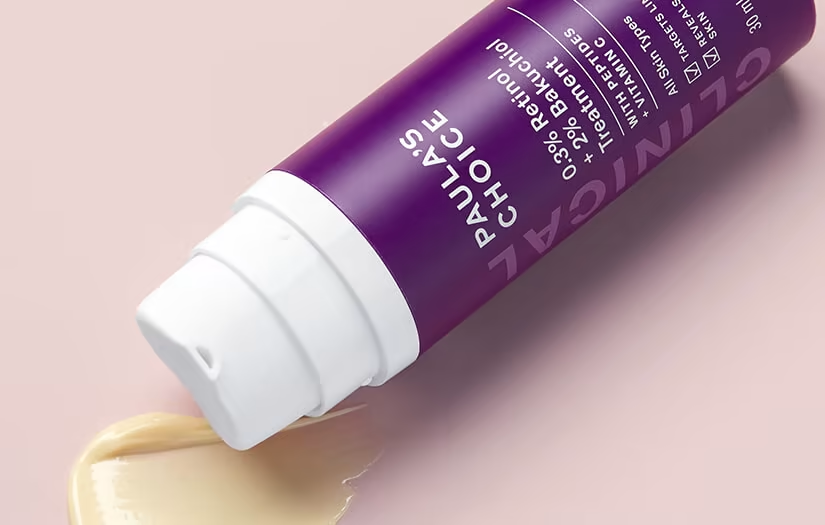
Can You Use Vitamin C With Retinol?
Vitamin C and retinol are probably two of the most potent and tricky skincare ingredients to use in your everyday skincare routine. With vitamin C often becoming oxidised, especially when it isn’t stored correctly once opened, and retinol causing its usual side effects of dryness and flaky patches. I wouldn’t blame you for having doubts about teaming these ingredients together, but that is exactly the aim of today’s blog post as I hope to answer whether you can use vitamin C with retinol.
Can you use retinol and vitamin C together?
Yes, it is considered OK to use retinol and vitamin C in your routine, there are three ways to combine retinol and vitamin C.
Take a look below and decide for yourself which would be the most effective way of using them. I would also suggest if you had any further concerns to seek the help from a medical professional or dermatologist.
Use vitamin C in the morning and retinol in the evening
You can really gain optimal results when you apply each ingredient during different parts of the day. Vitamin C for example is best used in the morning, leaving retinol or any form of retinoids for the evening.
By using vitamin C in the morning, you are setting your skin up for the day with a protective coat. This enables the skin to shield itself from any exposure from the sun’s harmful UV rays which leads to the surface of the face developing hyperpigmentation and dark spots. There is also the risk of skin ageing caused by other free radicals, such as pollution, harsh weather, and central heating. All of which are combatted by the antioxidant’s properties packed into vitamin C product formulations.
Following this with retinol in your evening routine will ensure you are targeting any concerns with skin ageing, such as fine lines and wrinkles. You will also find that thanks to the fact that retinol increases the speed of the skin cell cycle results in your complexion looking healthy and glowing.
Wait 30 minutes between applying vitamin C and retinol
This is a technique that you should follow once you are fully confident with how your skin would react to using each ingredient together. Allowing 30 minutes to ensure the vitamin C serum is fully absorbed into the skin will result in pH levels of the face becoming balanced again. Once the 30 minutes has passed you will be able to apply your chosen form of retinol, by using each ingredient in this staggered method you will reap the rewards without overloading the skin. Just ensure you keep a close eye on how your skin looks and feels, if there is any signs of severe irritation or dryness switch to a different method of applying each ingredient.
Alternate between retinol and vitamin C
If you’re finding using retinol and vitamin C together is becoming too much for the skin, you can try alternating applying each ingredient on different nights throughout the week. This will ensure you’ll benefit without the worry of pH levels becoming imbalanced or increased skin irritation.
Whichever method you decide to use make sure you have introduced both vitamin C and retinol into your skincare routine the correct way. If you are a little unsure of how to use vitamin C or even add retinol into your routine check out our blog post about the skincare benefits of retinol- why is retinol good for skin?
Do you put vitamin C on before or after retinol?
It is thought that the best way of applying vitamin C is before retinol. This is because each ingredient has different pH levels and need enough time in between applications to allow the skin to regulate its natural pH back to return to normal.
As I have already mentioned you can also apply vitamin C in your morning routine and retinol in the evening. Whichever way you decide always remember to keep a watchful eye on how your skin is reacting. Should you see any signs of changes or irritation stop using all products containing each ingredient and seek the advice of your doctor.
When should you not use retinol?
Retinol is one of the most effective and potent skincare ingredients. This not only makes it a great addition to anyone’s skincare routine who are wanting to combat signs of ageing, acne flare-ups and a lack lustre complexion. What you will also find is that it can be quite tricky to use retinol if you have a dry skin type or a skin that is prone to sensitivity and other skin conditions such as rosacea and eczema.
Ensure you build your skin’s tolerance to topical retinol products and always apply a daily SPF of 30 and above to keep the UV damage at bay.
How often should I use retinol?
Introducing retinol into your evening routine requires some time and dedication, especially if your formula contains a high or medical grade percentage of retinoid.
To start with, apply retinol once a week for the first couple of weeks. You can expect to find there are some signs of flaky patches, flushing and itchiness to the skin, this is a common side effect of using retinol and will subside after a few weeks. You can then increase the number of times you apply retinol to twice a week, until you can apply it every other day.
As tempting as it may feel to ignore all the retinoid rules and apply your product whenever you want, the side effects will be so severe you’ll suffer from a lot of discomfort, irritation, and redness. If you wanted to know more about how to use retinol and finding the best strength for you and your skin, check out our dedicated blog post about which strength retinol you need. Can you use vitamin C at night? Yes, you can, but it isn’t the best way of reaping the benefits from using vitamin C. Our skin is our largest and one of the most intelligent organs, as mentioned already, it can change and requires a helping hand during different parts of the day. During your morning routine your skin will need help protecting itself from exposure to free radicals. This is when the antioxidants in vitamin C can step in and combat any damage from pollution, UV rays, central heating, and other environmental aggressors. Once the evening arrives the skin switches and needs assistance with repairing any existing damage or new damage caused from the day. If you find you have further questions about using vitamin C and retinol together, come and follow us over on our Instagram, we look forward to seeing you there!
DQH Knowledge drop: In your 20s, your skin cell turnover decreases. (Cell turnover is a key component in keeping your skin youthful.) You know what else slows down? Your collagen production. Starting in your 20s, collagen decreases by about 1 percent per year. Should you want to prevent fine lines and wrinkles, start by eliminating behaviors that contribute to premature aging. “If it’s bad for you, it’s bad for your skin,” says dermatologist Michel Somenek.
“Cigarette smoking reduces blood flow to the skin and causes premature wrinkling and a dull skin texture. Making the repeated pursed motion to inhale can also cause smoker’s lines. Alcohol and recreational drugs are toxins for the skin that damage its cellular structure and DNA,” Somenek tells us. “The faster you eliminate vices while you are young, the better chance your skin and body have to recuperate.” Also, adopting an anti-aging routine in your 20s is key. After all, the best offense is a good defense. We spoke to Somenek and experts Joshua Ross and Audrey Kunin to find out more.
Keep reading for the best anti-aging products for your 20s, according to skincare professionals.
Sunscreen
“We all know that the sun is the number one cause of skin aging and starting the prevention in your 20s is very important,” Ross says. “The majority of your sun damage won’t start to appear until you’re in your 30s, so don’t wait until you see it surface or you’ll be behind the curve. Stay ahead of it with a good-quality zinc-based sunscreen worn daily.”
Farmacy Green Defense Daily Mineral Sunscreen
An invisible sunscreen with SPF 30, plus botanical extracts meant to protect skin with tons of antioxidants. Bonus: It’s clean and fine to use under makeup.
Bareminerals Complexion Rescue™ Tinted Moisturizer Broad Spectrum SPF 30
Although we recommend you use your SPF and moisturizer separately, we also understand moments when you don’t have time or energy for that extra step. For those times, this bareMinerals moisturizer is a great thing to have on hand.
Vitamin C Serum
“A great introduction to anti-aging is to start with a vitamin C serum in your morning skincare routine,” Ross says. “It’s a powerful antioxidant that will neutralize free radicals and brighten the skin.” He adds that it’s a great way to counteract the effects of the sun’s harmful rays, which, as previously mentioned, are among the biggest causes of premature aging.
Drunk Elephant C-Firma™ Vitamin C Day Serum
The Drunk Elephant C-Firma is a lightweight serum that promises to give skin a glow by combining the brightening powers of vitamin C with ferulic acid, l-ascorbic acid, and vitamin E. The included sodium hyaluronate is meant to replace hydration loss, so you shouldn’t have to deal with any irritation.
Sunday Riley C.E.O. Rapid Flash Brightening Serum
This potent serum is jam-packed with vitamin C (15 percent, to be exact), which means it’s a potential superstar at both brightening skin and dousing it in antioxidants.
Peptides
Using peptides on your skin has many benefits, says Somenek. “The skin barrier is what defends the body against pollution, UV rays, bacteria, and toxins. It can be damaged by several everyday factors. Using topical peptides aids in building a stronger barrier,” he says. “Peptides comprise elastic fibers, which are a type of protein. These fibers help to make skin appear taut and firm. Peptides can also help repair damaged skin, relieve inflammation, and even out skin tone. Some peptides can kill acne-causing bacteria that is common in 20-somethings.”
Kunin agrees, saying, “Peptides are an excellent entry point for supporting collagen.” She recommends looking for face and eye treatments that contain these collagen-boosting powerhouses.
Charlotte Tilbury Magic Eye Rescue Cream
This Charlotte Tilbury super-emollient eye cream has a base of coconut oil and shea butter (read: it’s incredibly hydrating). Botanicals plus peptides are meant to help reduce dark circles and boost collagen, respectively.
This creamy moisturizer serves up potent collagen-boosting peptides and pycnogenol, and antioxidant-rich vitamin C. “Instead of sitting on top of the skin, peptides penetrate the outer layer so they go deep. The ‘signals’ they send tell the cells to produce elastin and collagen, which are needed for youthful-looking skin,” explains Somenek.
At-Home Peel Pads
Remember that skin cell turnover fiasco we talked about earlier? One way to help support it is by exfoliating. “Exfoliation is important to help keep skin fresh and luminous,” Kunin says. She recommends using at-home peel pads as an easy and effective way to exfoliate.
“The goal in your 20s is to fight the slowing pace of cell turnover. It is wise to use products that gently exfoliate, yet still remove oil and other impurities. Products that have Alpha Hydroxy Acids (AHA) or Beta Hydroxy Acids (BHA) are a good choice.”
According to Somenek, you should only exfoliate two to three times a week. “People of all ages are guilty of over-exfoliating and that can be too much of a good thing,” he says.
Dermadoctor Kakadu C Intensive Vitamin C Peel Pad
A few swipes of this Derma Doctor powerful peel pad promise to leave your skin glowing and smooth, thanks to the seven (yes, seven) types of chemical exfoliants, including AHA and BHA. It also contains vitamin C via Kakadu plum extract for added brightening and antioxidant protection.
KEY INGREDIENTS Kakadu plum extract is sourced from the Kakadu plum, a fruit grown in northern Australia. It contains vitamin C, which restores the skin’s natural barrier, increases collagen production, and soothes irritation.
Dr. Dennis Gross Skincare Alpha Beta® Universal Daily Peel Pads
These are the gold standard of peel pads, with a cult following and over 900 five-star reviews on Sephora. They’re easy to use and contain a blend of anti-aging exfoliating acids.
Emollient Night Cream
“In your 20s, you need to start upping the hydration in your skincare routine. You may have been cautious of over-moisturizing because of acne in your teens, but as you enter your 20s, your skin transitions and becomes drier,” Ross says. “I recommend an emollient night cream added into your evening skincare regimen.”
“Twenty-somethings need to make sure that they are not using creams that will clog their pores and cause excess oil production,” says Somenek. Opt for non-comedogenic products.
Cerave Skin Renewing Night Cream
One great choice is the CeraVe Skin Renewing Night Cream, which is a non-comedogenic night cream that leaves skin soft and glowy. It combines the moisturizing powers of ceramides and hyaluronic acid.
RoC Retinol Correxion Max Hydration Creme
“The best night cream ingredients contain retinol, benzoyl peroxide, and/or salicylic acid or hyaluronic acid. The goal is to moisturize, yet remove excess oil,” says Somenek. This Roc Retinol Correxion cream fits the bill as it contains both hyaluronic acid and retinol so it promises to moisturize while also being non-comedogenic.


